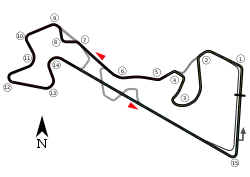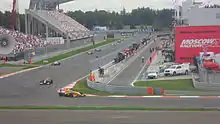Moscow Raceway
Moscow Raceway is an FIA-approved motor racing venue, which is situated in the Volokolamsky District of Moscow Oblast, near the villages of Sheludkovo and Fedyukovo, 97 kilometres (60 mi) from Moscow, Russia. It opened on 13 July 2012 for its first event as the fifth round of the World Series by Renault becoming the first major international motor-sport race track event in Russia. It is an FIA Grade 1 circuit, which means that it has all the requirements necessary to host a Formula One race, though the Sochi Autodrom currently hosts Russian Formula One races.
 | |
| Location | |
|---|---|
| Time zone | MSK+00 (UTC+04) |
| Coordinates | 55°59′45.8″N 36°16′6.1″E |
| Capacity | 30,000[1] |
| FIA Grade | FIA 1 FIM B |
| Broke ground | September 2008 |
| Opened | July 13, 2012 |
| Construction cost | 4.5 billion rub. ~$150 million |
| Architect | Hermann Tilke |
| Major events | DTM FIA GT1 World Championship FIA GT3 European Championship FIA WTCC RTCC World Series by Renault World Superbike SMP F4 Championship |
| Grand Prix 1 | |
| Surface | Asphalt |
| Length | 3.955 km (2.46 mi) |
| Turns | 15 |
| Race lap record | 1:24.831 (Arthur Pic, DAMS, 2012, Formula Renault 3.5 Series) |
| Grand Prix 9 | |
| Surface | Asphalt |
| Length | 3.931 km (2.44 mi) |
| Turns | 14 |
| Race lap record | 1:21.686 (Stoffel Vandoorne, Fortec Motorsport, 2013, Formula Renault 3.5 Series) |
| Sprint 4 | |
| Surface | Asphalt |
| Length | 2.555 km (1.588 mi) |
| Turns | 10 |
| Race lap record | 0:58.999 (Adrien Tambay, Audi Sport Team Abt, 2013, Deutsche Tourenwagen Masters) |
History
In September 2008, it was revealed that work was to begin on a Formula One circuit to be located at the village of Fedyukovo, Volokolamsky District. Official presentation of the project and laying of the first stone was held at the site on 1 October 2008, attended by architect Hermann Tilke and Formula One driver David Coulthard. Hans Geist, who at that time was the managing director of the project, stated that the track could pass an FIA inspection by June 2010, and that even without Formula 1 the project would be profitable staging either DTM or MotoGP. The cost of the project overall was 4.5 billion rub when it opened on 13 July 2012.
Design
Moscow Raceway[2] was designed to be categorized FIA 1T and FIM A, which would allow motorsport competition at any level, from national championships in auto and motorcycle racing, to Formula 1 and MotoGP.[3] The total designed track length is 4,070 metres (2.53 mi), with widths of between 12 metres (39 ft) and 21 metres (69 ft). The start/finish line has a width of 15 metres (49 ft) at an elevation of 22 metres (72 ft). The longest straight of 873 metres (2,864 ft) is designed to allow Formula 1 cars to reach a speed of 311 kilometres per hour (193 mph).[4] The circuit was finally classified as a FIM B grade course following inspections on 18 July 2012, one grade down from what was expected.[5]
Construction
Built under a Russian–German joint venture named "Autobahn", the general contractor for construction of buildings and race track to international level was Stroytech-5, a member of a group of companies Stroytech. Sub-contract partners included Siemens, while Sergei Krylov was working as an adviser.[6]
After initially signing a deal with Bernie Ecclestone in 2008, the project was dropped from the 2010 Formula 1 calendar in early 2009, and construction stopped. Construction resumed in June 2010, with the new contractor agreeing to complete the road section of the track by the end of 2011. By September 2011, all asphalt laying had been completed, and construction of the associated pit, support and medical buildings was being undertaken.
Race history

The first events held at the circuit were part of the World Series by Renault on 13–15 July 2012, where it also became the second international motor-sport event in Russian history after the FIA European Truck Racing Championship event took place in the Smolenskring in July 2010.[7] The first race itself was the 5th round of the Formula Renault 3.5 series, which was won by Dutchman Robin Frijns.[8] The first Russian to win a race there soon followed with Daniil Kvyat winning both races of the Eurocup Formula Renault 2.0 series round in a row.[9][10] A total of 10 Russian drivers were at the event including former 3.5 series Champion Mikhail Aleshin; many taking over other drivers for just this event.
On 21 July 2013, during the World Superbike weekend, Italian rider Andrea Antonelli was killed in the World Supersport race after being hit on the back straight by fellow rider Lorenzo Zanetti. Antonelli was airlifted to hospital where he died of massive head trauma, and the rest of the weekend's action was cancelled due to the torrential downpour that unquestionably contributed to the fatal crash.
Configurations
Layouts
 "Grand Prix #1"
"Grand Prix #1" "Grand Prix #9"
"Grand Prix #9" "Sprint #1"
"Sprint #1" "SuperSprint #1"
"SuperSprint #1"
Facilities
| Track | Distance | Corners | Grade |
|---|---|---|---|
| Grand Prix 1 | 3.955 km | 15 | 1 |
| Grand Prix 9 | 3.931 km | 14 | 1 |
| Sprint 4 | 2.661 km | 12 | 2 |
| SuperSprint 1 | 1.357 km | 10 | 3 |
| Full Circuit | 4.070 km | 21 | N/A |
See also
References
- Map and technical characteristics
- "Moscow Raceway is the only international level race track in the Moscow region".
- "Moscow to start construction work this week". GPUpdate. 30 September 2008. Retrieved 31 January 2011.
- Moscow Raceway
- "FIM Inspection: Moscow Raceway gets homologation for Eni FIM Superbike World Championship". www.moscowraceway.com. Archived from the original on 2013-01-29. Retrieved 2012-08-07.
- "Fast tracking Formula One". 2008-11-27. Retrieved 2018-07-28.
- "World Series by Renault a big hit in Russia". worldseriesbyrenault.fr. Renault Group. Archived from the original on 2012-08-21. Retrieved 2012-07-19.
- "Flying Frijns first to win in Russia". worldseriesbyrenault.fr. Renault Group. Archived from the original on 2013-02-13. Retrieved 2012-07-14.
- "Home win for Russia's Kvyat". worldseriesbyrenault.fr. Renault Group. Archived from the original on 2012-08-26. Retrieved 2012-07-14.
- "Kvyat does it again". worldseriesbyrenault.fr. Renault Group. Archived from the original on 2012-08-15. Retrieved 2012-07-15.